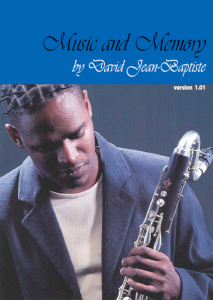Music and Memory
 Retention and Recall are quite simply what memory is all about. It is the ability to hear music in your head by heart, and to be able to recall the music by heart where and when it is needed. Your brain’s ability to retain and recall information is staggering, you have virtually unlimited potential; you will find practical techniques to master retention and recall later in this book.
Retention and Recall are quite simply what memory is all about. It is the ability to hear music in your head by heart, and to be able to recall the music by heart where and when it is needed. Your brain’s ability to retain and recall information is staggering, you have virtually unlimited potential; you will find practical techniques to master retention and recall later in this book.
Types of memory
There are several kinds of memory and it’s useful to know about them.These are, muscularmemory; aural memory; visual memory, where the musician creates a mental picture of the music score and or the geography of an instrument. There is standard memory, hand memory, intellectual memory, the type of memory that is based on analysing the music in detail, working memory, long-term memory, eidetic memory and déjà vu.
Muscular memory consists of the movements of the hands, arms and fingers that the brain recalls easily if there has been a lot of repetition in the learning process. So for muscular memory repetition is vital. Dancers have a saying `get the dance in the muscle´. The same applies to musicians.
Aural memory consists simply of remembering the tune in your head, basically picking the notes from out of the air. This can be developed to include the chord changes of the song, recognising patterns, scales and intervals. We all have some natural aural memory because everyone can sing or whistle a tune without access to the music. Attaining a highly developed aural memory requires much training; jazz and folk music demands its performers to be particularly
developed in this area.
Visual memory relates to the written music page. This is about recognising patterns and shapes on the page, and reproducing them in your mind’s eye; this could be called photographic memory. You can remember the way the music is set out on the page and actually what the notation looks like in the form of a picture in your mind.
Standard memorization gives the musician the ability to begin at any point in the music, and to play until a specific point in the music. This type of memorization requires more practice and concentration than hand memorization (see below). Those who want to become instructors must be good at standard memorization, because they will be required to play small portions of music during the teaching process. It is also very convenient to cut the
length of a particular piece for time-constrained performances.
Hand memory is not a conscious type of memorization like you might use to learn musical terms like adagio, allegretto or the running order of songs in a concert. Instead, the brain actually memorizes the pattern followed by the fingers and the musician generally does not need to think about what they are playing as it happens. This type of memorization is excellent when the musician needs to play the entire piece from memory. However, it is not quite as powerful as standard memorization.
Intellectual memory consists of knowing and analysing how the music is constructed in every detail inside and out. Things like knowing all the scales, arpeggios and chords, recognising and remembering them as they appear in the music aid intellectual memory. Chords are particularly helpful since they show how most of the notes
relate to each other. Knowing about chords, progressions and structures helps to understand how the music unfolds.
Working memory or short-term memory is quite simply the amount of musical information that a person can hold for a brief period of time in the conscious part of mind. Modern research has shown that a person can hold up to seven plus or minus two chunks of information at a time, before they basically trance out. This can be a very useful thing to know when taking in information.
Long-term memory is information that we keep stored for a long time. Most people can remember the first song they learned to play on their instrument. Long-term memory has virtually infinite capacity.
Eidetic memory, photographic memory, or total recall is the ability to recall images, sounds, or objects in memory with great accuracy and in seemingly unlimited volume; Wolfgang Amadeus Mozart had this ability.
Déjà vu , a subjective feeling that an experience that is occurring for the first time has been
experienced before. This is moving more into the paranormal aspect of memory. However this has happened to me on more than one occasion, where I found myself playing in a place where I had only previously visited in a dream.
Fringe Benefits
In addition to music, musicians are generally excellent at memorizing just about anything. Many times, the unconscious ability to memorize comes as a surprise to adults who began music education as a young child. Often, they do not equate their unique ability with thecountless hours of instrument practice and sight-reading. However, there is definitely a significant advantage when memorization skills are developed at young age and are not the sole focus of one’s efforts. Memorization abilities are merely a side effect of doing something amusician loves to do, playing and playing well from memory.
Those who realize their unique ability to memorize will excel in other areas of their life, in education for example. And, the ability to utilize the brain’s power to memorize increases confidence and allows older adults to maintain their memory function longer than those who have never had any sort of musical training. Certainly piano players are often considered the best memorizing musicians. In reality this is not really true, playing any musical instrument
well and spending the time necessary to perfect passages of any sort will give the musician a definitive ability to stay sharp and focused throughout their lifetime.
There are many ways that music assists our memory processes. Some music helps to hold part of our attention, and we take in more information in a highly focused state. Such music can lead people into an alpha brain wave state. The music of Johann Sebastian Bach has power to do this. Try writing or reading while listening to Bach. Alpha is a perfect learning state for taking in information through auditory channels. Music also evokes emotions and stimulates
visual imagery.
Have Fun, David
David Jean-Baptiste
© The Wellness Clarinet Ltd 2012
Related Posts
Tags: clarinet, clarinet and saxophone, clarinet music, how to play the clarinet, learn to play the clarinet, music and memory









